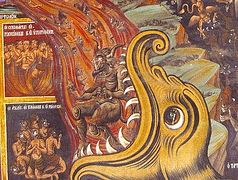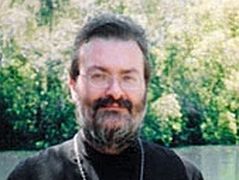Let’s prepare for confession with this experienced archpriest from the village of Otradnoye outside Moscow.
In the name of the Father, the Son, and the Holy Spirit.
Today is the Sunday of the Last Judgment. This Sunday always precedes Great Lent, reminding us that we will be judged. Once I brought Communion to an elderly lady, who told me about something that happened in her village. During a funeral, the dead woman suddenly sat up in her coffin. The priest ran into the altar in fright while the parishioners threw themselves at the door nearly crushing each other out of fear. Well you can imagine how people would react if a dead person suddenly sat up in his coffin. But that woman said, “Why are you afraid of me? I am just a human being, like you.”
They asked her, “What did you see? What was revealed to you?” She only answered:
“Don’t judge anyone. We are going to be judged very severely. Don’t judge anyone.”
Judge not that ye be not judged (Mt. 7:1)—this was written in the Gospels. We should try to fulfill this commandment.
We break many commandments, of course, due to our weakness bound up with our human nature. For example, a man feels like eating or sleeping. He ate, violated the fast or ate too much. Or he was lazy about doing something, did not do his prayers out of laziness, or overslept. Well, as they say, what can we do? It’s out of youthfulness or something else…
But what is judgment connected with? What is the need for it? To eat, sleep, or drink? It’s not connected with anything! See, how wisely this commandment is given for our salvation. Do not judge, and you will not be judged. And that is really how it is. I have seen such cases in my lifetime.
One man drank, out of weakness—friends, comrades, situations, as if to get strength, a sort of physical need. But he never drank too much. After all, we are not told never to take wine, but rather, And be not drunk with wine, wherein is excess (Eph. 5:18). And this man tried never to judge anyone. At the end of his life he repented, received Unction and Communion, and died like a Christian, having corrected himself and left all behind. He was stricken with a serious illness before he died. Who knows—perhaps it was because he tried never to judge anyone: Judge not that ye be not judged—and the Lord purified him through sufferings, brought him to repentance and confession, to spare him condemnation, because he never judged anyone.
We know of one example from the holy fathers, when a monk due to weakness fasted less strictly than the others, and had some falls into sin… But when he lay dying and the brothers came to bid farewell, he was in a peaceful, happy mood. Death was at the doors; he would have to answer for himself—how terrifying! They asked him, “How can you be so calm? Perhaps there is something you haven’t confessed?
But he said, “Yes, it’s true, I have sinned many times out of weakness. But I always tried to keep two commandments when I came to the monastery: to never judge anyone and to forgive everyone, never to think ill of anyone. Well, angels came to me last evening and said, “Yes, of course he’s sinned, but he kept two of God’s commandments. It is said, For if ye forgive men their trespasses, your heavenly Father will also forgive you: But if ye forgive not men their trespasses, neither will your Father forgive your trespasses (Mt. 6:14-15). And, Judge not, that ye be not judged. And since the Lord said so, that is how it will be. The Lord will not judge him and will forgive him everything.”
Do you see what simple conditions the Lord has given us for salvation? In general they are not so difficult to fulfill. Let’s say that we cannot fast and pray due to infirmity. But we can refrain from judging no matter what our state of health is.
Of course, this is not so simple, because even if you yourself don’t judge, others may try to get you to do so. For example, others are talking about someone and judging him, and you should as if out of politeness nod your head and say, “yes, yes.” And if you’ve nodded it means you’ve judged. These are sins that we especially have to avoid.
The reposed Metropolitan of Krutitsa and Kolomna Nicholai, God rest his soul, had such a gift of words, and gave beautiful sermons. Well, he said these very simple words: “Brothers and sisters! To forgive everyone and never judge anyone is salvation without work.”
Well, we can somehow refrain from saying, “yes, yes.” But non-judgment is not only a matter of the tongue, and forgiveness is not only in words, but also in the soul, feelings, and heart. It has been said, Whoever forgives sins from the heart… This is of course a great labor, because in order to forgive from the heart we have to humble ourselves. But when you try to humble yourself you will begin to understand just how hard that is.
The Lord, of course, forgives if you forgive, and will not judge you if you do not judge. But how hard that is, not to judge, never to hold a grudge—if you do not have humility. And only humility, the awareness of your sinfulness, can give you the ability to humble yourself. And if the thought arises to judge another then immediately remember: “Why should I look at another when I myself am sinful? And how can I judge another when I myself will be judged? He is sinful in one way, while I am bad in another, perhaps even worse than him. He might have sinned in ignorance but I sin knowingly. Perhaps he has such a character, upbringing, or nature, and I have another nature yet I do such things…” This is how we have to humble ourselves continually. In this consists the acquisition of a constant feeling of repentance. This is spoken of in the fiftieth psalm: For I know my iniquities, and my sin is ever before me (Ps. 50:5). “Ever” means always; that is, we always have to keep our sinfulness before us: “I am sinful; and who am I to judge another?”
Every sin that you see around you should remind you of your own sinfulness. Through this feeling comes, by God’s mercy, humility; that is, the true awareness of your own weakness. And this feeling was what all the saints had.
One of the monastic saints closest to our times, St. Seraphim of Sarov, always said of himself, “I, pitiful Seraphim.” We call people pitiful who are not normal, not very smart, but he talked about himself that way…
The holy forefather Abraham said of himself, “I am dust and ashes.” St. Macarius the Great said, God be merciful to me a sinner, for I have never done anything good in Thy sight.” St. Anthony the Great said, “I, of course, am not a monk, but I have seen monks.”
The saints were always in such a state, with such humility.
How do we differ from them? First of all by the fact that we do not have this humble feeling all the time. That is, sometimes you feel that you’re a sinner… But at other times you’re the judge, teacher, instructor, and even reprover of another: “Well, you are this and that, and how can you not correct yourself, and what on earth are you doing?!” But at the same time you don’t even know what you yourself are capable of doing. This is just the spiritual inconstancy that we have.
One spiritual man, a priest close to our times, said to his spiritual daughter, “There are times when an icon could be written of you, and times when a pulp novel would be more appropriate.” That is the way we are in our behavior.
Forgive us, Lord!
We have no constancy, just good impulses… Sometimes they come more often, sometimes less. But we need to try, and this is the most important thing, to constantly remind ourselves of our sinfulness. This is the main meaning of the Jesus prayer: Lord, Jesus Christ, Son of God, have mercy on me a sinner. These words should be repeated all the time so that we don’t forget who we are
Here is the simplest example. We come to church to receive Communion. We’ve prepared ourselves, and now we need to feel that we are sinful. But it is often the other way around—when people feel that they are sinful but we don’t go to confession or Communion, saying, “I have some kind of coldness in my soul, irritation. In general something’s just not right. No, I won’t go.” And they don’t go. But this is precisely when we should go, because at this moment we feel what we in fact are. But often people only go to confession and Communion after they’ve brushed and ironed themselves. They as if bring their sins, but already brushed, everything written down, all the sins. And there, so to say, the sin account is prepared, and the balance entered. But this inner state is really not what is needed for confession and Communion.
It is the same after Communion—we’re inwardly relaxed, and have already forgotten that we are sinful. Although we’ve received Communion we are after all still sinners. Then a temptation arises on that very day, and it turns out that our state is not really of that nature.
Sometimes people say, “I’ve received Communion, and it’s almost as if it’s bad somehow.” But, by the way, this does not mean that it’s bad. This may be God’s special mercy, so that we would feel that although we’ve received Communion we are far from saints—if we can even talk about any manner of holiness with respect to ourselves at all.
Bishop Ignatius (Brianchaninov) says that our entire inner state is one of constant prelest (spiritual delusion); that is, a false spiritual state.
Sometimes we feel consolation, satisfaction, or a certain collectedness. But at these times we are in fact disinclined toward a state of repentance, which we should have all the time. And if you feel a state of joy and gentle calm or peace after Communion, then that is good; but do not forget that you are after all a weak, sinful person. This is the most important thing.
The prayer of St. Macarius the Great [read at morning prayers.—Trans.] gives us just this correct state of soul:
O God, cleanse me a sinner, for I have never done anything good in Thy sight; deliver me from the evil one, and may Thy will be in me, that I may open my unworthy mouth without condemnation, and praise Thy holy name of Father, Son and Holy Spirit, now and ever, and to the ages of ages. Amen.
And may Thy will be in me means that he is still asking for this, that he does not feel that God’s will is already in him; that is, that his self-will is still alive in him. And this is St. Macarius the Great!
In this repentant state he also went through the tollhouses. And the demons couldn’t even get near him. They only yelped from a distance, “O Macarius, you’ve gotten away from us!” But he said to them, “No, I haven’t gotten away from you yet.” When he was at last walking through the gates of paradise the demons wailed, “Oh, Oh!” Meaning that a soul had passed by and they couldn’t do anything with it. The demons could not reproach him with anything, he was so pure—in the earthly way, of course, for before God not even heaven is pure. And so, only after he had passed through the gates of paradise did St. Macarius say, “By God’s mercy I got away from you.” That is, “I am weak, it is the Lord Who had mercy on me, and therefore I got away.”
That is the state of humility the saints had. Then how much should we, who cannot even come close to their sanctity, purity, and spiritual height, humble ourselves. Who do we think we are compared to them?
Well, perhaps we don’t always remember the saints. But when we see the sins of others (and this is what we see most of the time), then we must immediately remind ourselves of our own sins. That is what the saints always did. When they saw their neighbor sinning they strove to avoid judgment and to remember their own sinfulness.
There are many such examples in the lives of the saints. One elder passed with his disciples by the hypodrome—that’s a sort of stadium—where contests were taking place. In those days they also had competitions, Olympic games—we still have them. The disciples said to the elder, “The demons are delighted at the sons of darkness.”
But the elder strove not to judge, and said, “Look at what zeal they put into getting applause or some sort of laurel on their head. But we don’t show such zeal for Kingdom of Heaven.”
And truly, you look at a drunk—this is particularly obvious—how he runs to the liquor store in the morning. Do we always run like that to church? Alcoholics burn out their gut with that poison, hardly eat anything, well maybe a piece of bread or a pickle, and we say, “How can I fast? My stomach hurts…” Many of us are already thinking, “How am I going to fast?” Just look at the alcoholics—how they fast. And remind yourself how you should fast for God’s sake.
Thus the sins that we see in others can be edifying for us. Do not judge others—and learn yourself. Learn, let’s say, the zeal, which they apply in the wrong direction, but which you don’t have.
Lord forgive us! We have sinned with all our feelings, in word, deed, and thought. First of all, of course, in pride, self-opinion, self-justification, egotism, selfishness—how sorry we feel for ourselves, how unhappy we are. We want everything here, all sorts of pleasures. In our pride we sin by self-will, stubbornness, by the lack of desire to yield and serve our neighbor, by lack of mercy.
We have sinned by judging, of course, and idle talk and slander. By gloating over others’ woes, wishing them ill, speaking ill, cursing, and envy—again, because we don’t feel our own sins. If we felt that we are sinners we would not envy, because we would admit that we deserve what we get, since the Lord sends it. Instead you should say, “Glory to God for all things!” The Lord sent you this—thank God for it.
The apostle James even says, My brethren, count it all joy when ye fall into divers temptations (Js. 1:2). After all, what is temptation? This does not happen accidentally, and the Lord allows it. Of course this does not mean that when we sin we do well—no. But when we fall into temptations and our sinfulness comes out, we see how weak and sinful we are. But then we complain. Forgive us, Lord!
We sin by displeasure, reproaching each other, anger, mockery, scandalizing; gluttony, love of pleasure, indulging in delicacies, overeating. We sin by vainglory, and we love praise. Forgive us, Lord!
We sin by laziness. We are especially lazy about prayer and doing good deeds—and in general about correcting our souls.
We sin by accepting lustful, impure, and blasphemous thoughts, when all sorts of dirty thoughts climb into our heads—this is also our weakness. Forgive us, Lord!
You need to always remember that the thought that comes is not yet the sin. But if you linger in it, stare at it, and give yourself over to daydreams, it becomes a sin.
We sin in all our feelings, both emotional and physical. Let us pray to the Lord: Lord have mercy!





